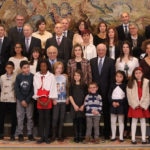The Acción Magistral Awards recognizing the best projects for education in values are back
The registration process for taking part in the 2016 Acción Magistral (Teacher Action) Awards begins on February 23. These awards offer an incentive to teachers who want to go beyond their daily obligations and who strive to instill in their classrooms values as necessary as solidarity or respect for others.

FAD, the Spanish Commission for Cooperation with the UNESCO and BBVA invite all Spanish teachers to take part in these awards. Those interested can sign up for the different categories from February 23 to April 29. They must have developed or be developing during the 2015/2016 school year relevant educational projects in the area of Education in Values.
Opportunity and recognition
In all the editions of these awards, the participating teachers from around Spain are living in different situations in very disparate centers, but they all share a common concern. “I wanted a chance to show the effort made by teachers. Over the years we’ve fought for education to help all children who have been hit by very complicated and painful situations. This is their only opportunity: education and school”, explains Ester Martínez, the winner of the last edition with her project “Looking for Traces”, an initiative that promotes social values at Doctor Peralías Panduro school in Corteconcepción (Huelva).
The teachers who have won other editions agree that what is important for them is not the prize in cash. “For me and for my family it was a recognition of the effort, the excitement of working with children on something as invisible, but obvious and necessary, as the values that shape responsible individuals”, says Román Ruíz Guirao, who won the award with his project “Looking for Traces” at Pintor Pedro Flores school in Puente Tocinos (Murcia), in partnership with Miguel Hernández school in Granada. Through a study of the historical and cultural heritage of Murcia, Granada and Toledo, this initiative shows the students how the peaceful coexistence of different cultures is possible.
The registration and selection process is followed eagerly by the candidate schools as they progress through the different phases. “When we got through the first filter and there were only 80 of us left, the spark and excitement awakened in us. In the last phase, when we had real possibilities, the nervousness, eagerness and pride could be felt in the atmosphere”, said Román Ruíz. In others, however, the feelings are more personal, as happened to Ester Martínez: “When I opened my email and read ‘Congratulations! You have passed the regional phase, you are one of the 20 finalists’, I was excited and happy. And when they told us that we had won, there was silence. I didn’t tell anyone. I waited for a few hours to absorb the news and when I arrived at school I said in the meeting room: “We’ve won a €4,000 prize!”. My colleagues, nearly all of them new, stared at me in disbelief”.
After the maelstrom of the awards, the satisfaction for a job well done remains. “For the school it is a great boost, motivating us to continue working and educating children in contexts of exclusion”, says Román Ruíz. For Ester Martínez it is also a way of vindicating the work of all the teachers who educate in values: “Our voice can now be heard louder”.